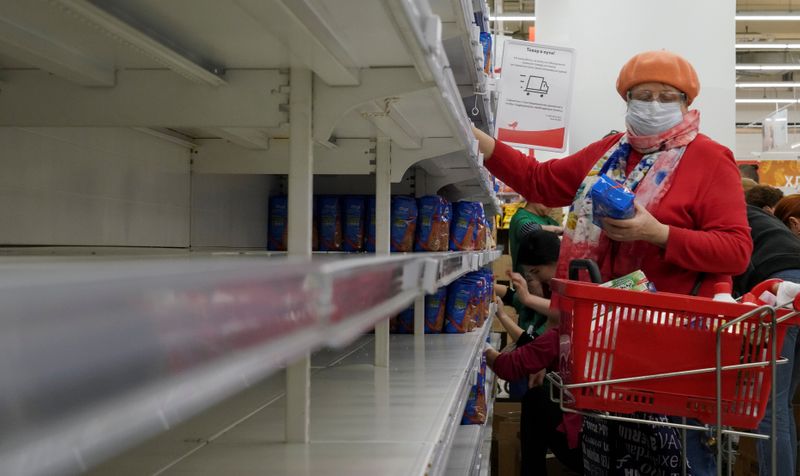This post was originally published on this site
https://i-invdn-com.akamaized.net/trkd-images/LYNXMPEG4510D_L.jpg
MOSCOW (Reuters) – Russia plans to dig deeper into its rainy day fund, double borrowing and postpone some national projects, Finance Minister Anton Siluanov told the Vedomosti business daily, as coronavirus is seen knocking the economy down even harder than sanctions.
Russia, which has overtaken France and Turkey in the number of confirmed coronavirus cases, currently close to 166,000, has been largely on a lockdown since late March, which along with weak oil prices is hurting the domestic economy.
Low oil prices and the lockdown mean the economy will shrink by 5% this year, Siluanov said.
That would be its worst performance since a 7.8% fall at the height of the global financial crisis in 2009. The economy shrank by 2.3% in 2015, due to a fall in oil prices and sanctions imposed following the annexation of Crimea from Ukraine.
Budget revenues are expected to fall 4 trillion roubles ($54 billion) below expectations this year. Lower oil and gas revenues will account for a reduction of around 1.5 trillion roubles.
As a result, this year’s budget deficit is expected to hit 4% of GDP, Siluanov said. Russia ran a budget surplus of 1.8% of gross domestic product last year and was expecting a 2020 budget surplus of 0.8% of GDP.
To compensate for the lost revenue and to meet its social obligations, Russia will use more funds from the National Wealth Fund (NWF), Siluanov said, as well as proceeds from the recent sale of a stake in Russia’s biggest bank, Sberbank (MM:SBER).
Last month, the finance ministry used the NWF funds to buy a controlling stake in Sberbank from the central bank. The bulk of these proceeds are to be returned to state coffers.
Before the pandemic hit, Russia was expecting the economy to expand by 2% this year, and President Vladimir Putin has been promising to increase the rate of growth through 2024 with a range of high profile national projects.
Those plans, which called for Russia to speed up the spending of $350-billion on 13 strategic areas ranging from healthcare and education to infrastructure this year, may be adjusted, Siluanov said.
To protect the NWF, state borrowing will double this year to 4.0-4.5 trillion roubles, Siluanov said.
“We do not want to spend much from the NWF, it would not be right to spend it in two years,” he told Vedomosti.
Before the coronavirus outbreak, Russia planned to raise 2.3 trillion roubles in rouble OFZ bonds and up to $3 billion in Eurobonds this year.
Two packages of fiscal stimulus already cost Russia 2.8% of GDP in direct measures alone, excluding debt and spending from the rainy-day fund.
A third package, yet to be announced, would provide support to recover after restrictions are lifted, Siluanov told Vedomosti. Putin has yet to say when restrictions are likely to be eased.
($1 = 74.4400 roubles)


